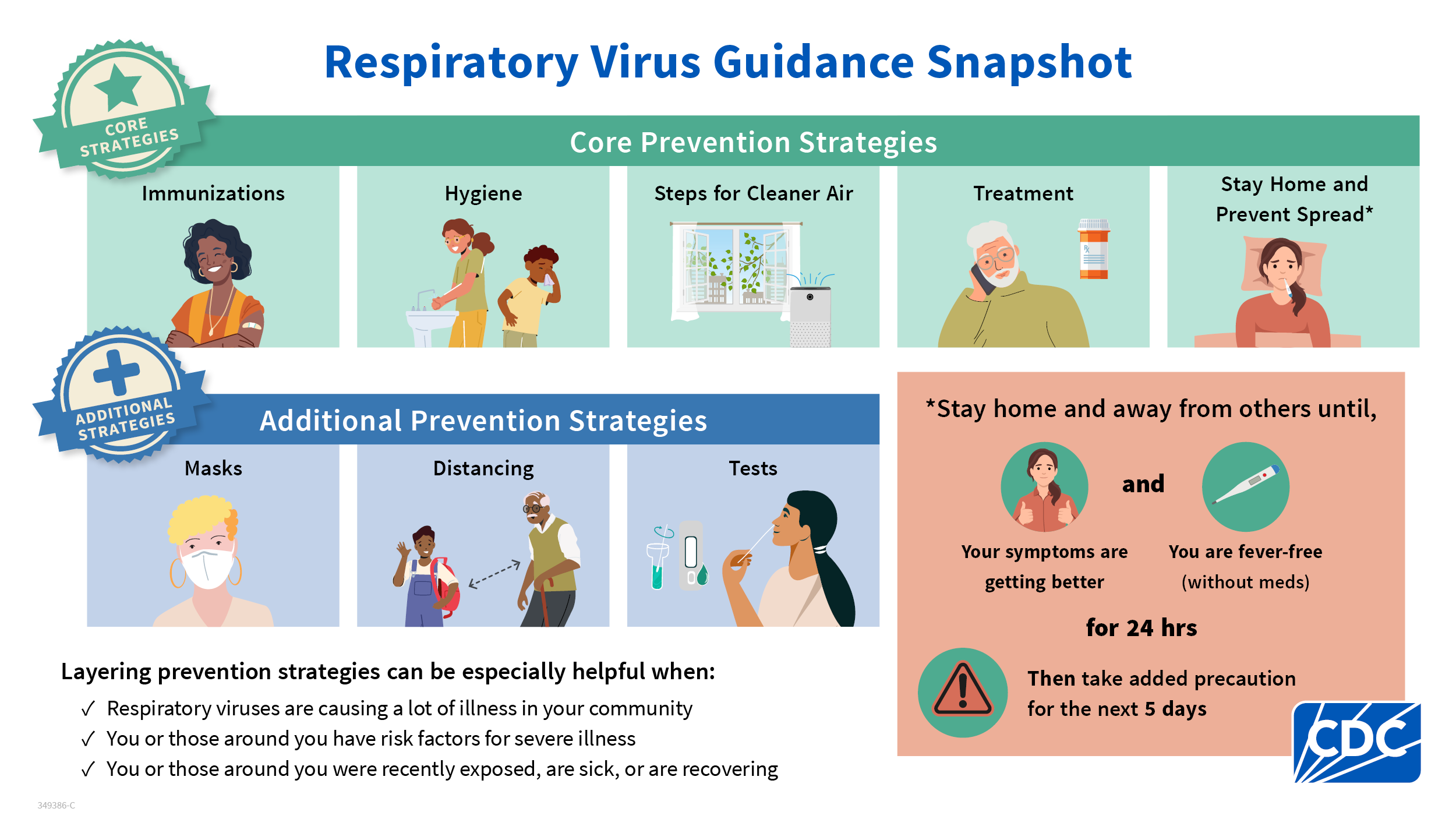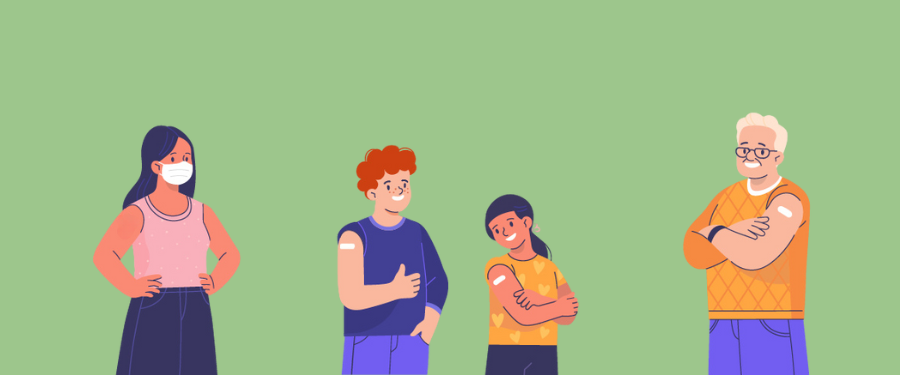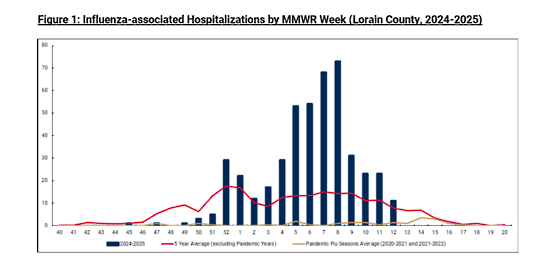Respiratory viruses
Schedule a vaccine appointment
Take care and take action to protect yourself and others from respiratory viruses.
Each year respiratory viruses are responsible for illnesses, hospitalizations and deaths. Read on to learn how to reduce your chance of catching or spreading a respiratory virus – such as COVID-19, flu and respiratory syncytial virus (RSV). You can take action to protect yourself and others from health risks caused by respiratory viruses.
About these contagious respiratory viruses:
- COVID-19 spreads quickly. Most people have mild symptoms, and some people become severely ill. People who are older, pregnant, or have a chronic disease are at a higher risk for getting severely ill. A vaccine for ages 6 months and older helps to prevent and reduce the severity of COVID-19.
- Flu infects the nose, throat, and sometimes the lungs. Symptoms vary from mild to severe. Flu can be serious, especially for people younger than 5, older than 65, pregnant, or with a chronic disease. A vaccine for everyone ages 6 months and older helps prevent and reduce the severity of flu.
- RSV usually causes mild, cold-like symptoms. Most people recover in a week or two. RSV can be serious, especially for babies and older adults - both have a higher chance of being hospitalized. The Centers for Disease Control and Prevention (CDC) recommends an RSV vaccine for people who are pregnant, all adults ages 75 and older, and for adults 60-74 who are at increased risk of severe RSV. Contact your healthcare provider to discuss your risk.
Core prevention strategies to protect yourself and others
There are multiple ways you can keep healthy and lower your risk of catching or spreading a respiratory virus.
Get vaccinated. Vaccines are the safest way to build immunity from a virus. Vaccines help the body learn how to defend itself from disease without the dangers of an infection. The most important thing you can do to protect yourself from COVID-19, flu, and RSV is to get recommended vaccines and stay up to date. Vaccines often tame these viruses to prevent their worst outcomes, like hospitalization and death.
- Does Lorain County Public Health have the COVID-19 vaccine or flu shot yet?
- COVID-19 vaccines are available at Lorain County Public Health (LCPH). Schedule a vaccine appointment using our fast, easy-to-use online scheduling system.
- We carry Pfizer products.
- Flu vaccines are available at LCPH. Schedule a flu shot appointment.
- We encourage everyone 6 months and older to get their annual flu shot in November for best protection through the peak of the respiratory virus season.
- In northeast Ohio, we often have an increase of respiratory illness in the community from January to March, or sometimes through April. (This is what happened during the 2023-2024 respiratory virus season.)
- RSV vaccine: The RSV vaccine is available at LCPH. Call 440-284-3206 to book an appointment for the RSV vaccine.
- COVID-19 vaccines are available at Lorain County Public Health (LCPH). Schedule a vaccine appointment using our fast, easy-to-use online scheduling system.
- When should I get vaccinated?
It's safe to get the COVID-19 vaccine now (and RSV vaccine if that applies to you).
It’s safe to get the flu shot now.
Practice personal hygiene. You can protect others when you choose to cover your coughs and sneezes, wash or sanitize your hands often, and clean surfaces you touch a lot.
Take steps for cleaner air. Bring in fresh, outside air by opening a window, purifying indoor air, or having outdoor social activities.
Stay home when sick, and away from others. When you have a respiratory virus infection, you can spread it to others. These symptoms can include fever, chills, fatigue, cough, runny nose, and headache, among others.
- Go back to your normal activities when both are true for at least 24 hours:
- Your symptoms are getting better overall,
and - You are fever-free without using fever-reducing medication.
- Your symptoms are getting better overall,
- Consider using additional tools to protect others for the next 5 days. Steps you can take include keeping air cleaner, hygiene, masks, physical distancing, and/or testing options.
- Keep in mind that you may still be able to spread the virus that made you sick, even if you are feeling better. You are likely to be less contagious at this time, depending on factors like how long you were sick or how sick you were.
- If you develop a fever or you start to feel worse after you have gone back to normal activities, stay home and away from others again until, for at least 24 hours, both are true: your symptoms are improving overall, and you have not had a fever (and are not using fever-reducing medication). Then take added precaution for the next 5 days.
Contact your healthcare provider about worsening symptoms, testing, or treatment, and especially if you or someone you care for is at high risk for complications from a respiratory virus.
- Early treatment for COVID-19 and flu may prevent severe disease in people at higher risk, even if they are up to date with their vaccines. People who are at higher risk for severe illness who start to feel sick should seek health care right away so that they can access testing and/or treatment.
- Healthcare providers can help you manage symptoms of RSV if you or your child are sick.
Specific to COVID-19
|


I never had symptoms but tested positive for a respiratory virus, what do I do?
You may be contagious. For the next 5 days: take added precautions, such as taking additional steps for cleaner air, hygiene, masks, physical distancing, and/or testing when you will be around other people indoors. This is especially important to protect people with factors that increase their risk of severe illness from respiratory viruses.
How long am I contagious?
Once your symptoms are getting better overall and you are fever-free for 24 hours (and are not using fever-reducing medication), you are typically less contagious, but it still takes more time for your body to fully get rid of the virus. During this time, you may still be able to spread the virus to others. Taking precautions for the next 5 days can help reduce this risk. After these 5 days, you are typically much less likely to be contagious. However, some people, especially people with weakened immune systems, can continue to spread the virus for a longer time. For COVID-19, taking an antigen test can help you know how likely you are to spread the virus. A positive test tends to mean it is more likely that you can spread the virus to others.
How long someone can spread the virus depends on different factors, including how sick they are (severity) and how long their illness lasts (duration). This is not the same for everyone. If you’re feeling sick, you should stay home and away from others.
Example 1: Person with fever and symptoms.
Example 2: Person with fever but no other symptoms.
Example 3: Person with fever and other symptoms, fever ends but other symptoms take longer to improve.
Example 4: Person gets better and then gets a fever.
Contact an expert
Talk to a public health professional about respiratory viruses, communicable diseases, or vaccines. Call Lorain County Public Health at 440-322-6367.








